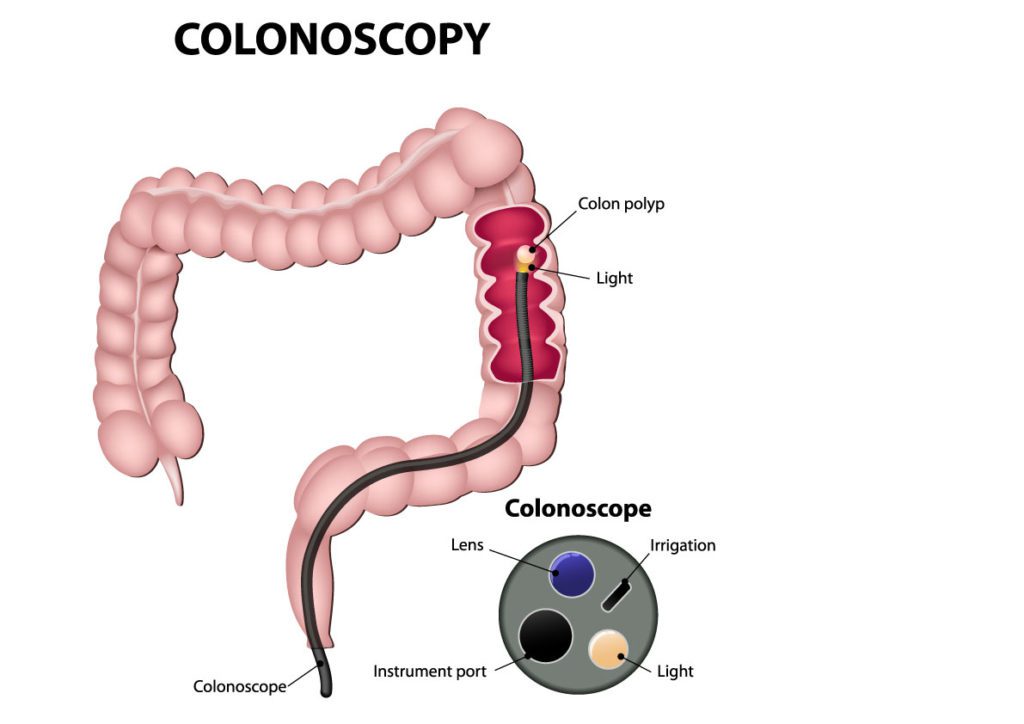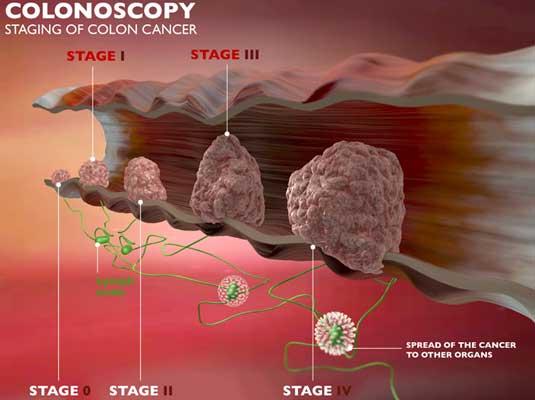Colonoscopy
Getting A Colonoscopy Is Important For Colorectal Health
There are up to 200 different types of cancers, and according to the American Cancer Society (ACS), colon cancer is the third highest cause of cancer-related deaths. The ACS expects to see an estimated 97,220 new cases of this type of cancer in 2018. Men are slightly more at risk of developing cancer in the colon than women, but not by much.
Thanks to improve screening, diagnosis, and treatment methods, the death rate due to cancer in the colon has been dropping for many years. In fact, the survival rate is 92 percent when this cancer is detected early.

What Is Colon Cancer?
The colon, which is also called the large intestine or large bowel, is a five-foot-long intestine that is three inches in diameter. The colon removes water and salt from waste to create a stool and then pushes the stool into the rectum. Nerves in the rectum give us the feeling for the need to have a bowel movement. Small clusters of cells called polyps can develop inside the colon. In most cases, these cluster of cells generally do not cause any problems or symptoms, but they can become cancerous over time.
Therefore regular endoscopy procedures for cancer in the colon are recommended by doctors for individuals who are 45 years of age or older (you can also have yearly stool blood tests or DNA tests every three years to monitor for colon cancer).
How To Detect Colon Cancer Symptoms
People usually do not experience any early symptoms of colon cancer during the early stage of this disease. Therefore, regular endoscopy procedures for cancer in the colon are recommended by doctors for individuals who are 45 years of age or older. This is when individuals are most likely to develop this disease. People can experience different symptoms based on the stage of this cancer, the size of cancer, and where the cancer is in the colon. Some of the colon cancer signs that may appear as the cancer advances to different stages include:
- Blood in the stool
- Sudden and unexplained fatigue, weakness, and weight loss
- Constant abdominal pain, cramps, and gas
- Diarrhea or constipation that lasts more than four weeks
- Painful bowel movements and a feeling of not emptying completely
- Constant urge to defecate and a change in stool consistency
These symptoms resemble the symptoms of other illnesses and diseases. That is why it is important to have a screening to see if these symptoms are related to cancer or some other condition.
What Causes Colon Cancer Symptoms?
A colorectal polyp is a collection of cells that can appear in the colon and in the adjacent rectum. Cancer in this area is often referred to as colorectal cancer because these clusters of cells can develop in the colon and rectum simultaneously. Benign cell clusters can turn cancerous, and there are several risks factors that increase the chances of benign colorectal polyps turning cancerous. These include:
- Having a family history of colorectal cancer
- Being over 45 years of age
- Being Black or African-American
- Having a personal history of chronic inflammatory intestinal conditions like ulcerative colitis
- Being obese or having diabetes
- Smoking or heavy alcohol usage
- Having radiation therapy for other types of cancer in the abdominal area
Some researchers believe having a high-fat low-fiber diet or having a diet that is heavy in red meat consumption can lead to developing colorectal cancer. The results of this research are mixed, so there is no definitive correlation between people who eat these types of diets and higher rates of colorectal cancer.
How Quickly Does Colon Cancer Symptoms Progress?

All cancers go through five stages of progression, which are:
- Stage 0 – cancer has stayed in place and has not spread to other tissue
- Stage 1 – cancer has not grown too deep into the tissue and has not spread to other parts of the body
- Stage 2 – cancer has grown to the outer layers of the colon
- Stage 3 – cancer has grown through the colon and reached nearby lymph nodes
- Stage 4 – cancer has reached tissues in other parts of the body
There are numerous factors that determine how long it takes to go from one stage to the next, so there is no standard timeline.
If you live in the Kitsap Peninsula area and are 45 years of age or older; or have a family history of colorectal cancer, schedule your initial consultation with Kitsap General Surgery today. We will answer all your questions and concerns about having a colonoscopy and provide instructions on the colonoscopy prep process.
Call us today so we can help you live a better tomorrow!
360.613.1335
You can click here for colonoscopy preparation instructions.
Additional Information
Call Us
360.613.1335
Message Us
To request an appointment
Locate Us
Get directions to our office
